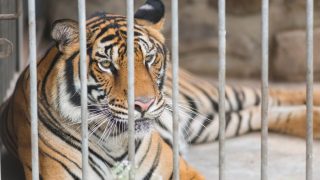
Captive Big Cats: Now You See Them, Soon (We Hope) You Won’t
Late last month, the Animal Legal Defense Fund partnered with Keepers of the Wild, a big cat sanctuary in Arizona, to formally urge Las Vegas magician Dirk Arthur to retire the big cats used in his Wild Magic show. In a letter, ALDF reiterated its offer “to help rehome these cats and ensure that they have the retirement they deserve after years of performing.” With SeaWorld’s recent announcement of its intention to discontinue using captive orcas in its shows, and alongside the imminent final use of elephants in Ringling Brothers’ circuses, now would seem a fine time for Mr. Arthur to transition to cat-less magic.
Another prominent Las Vegas magician, Rick Thomas, made the decision to retire his six tigers more than three years ago. After two decades working with tigers he had personally raised and trained, he elected to send them “out to pasture” at Keepers of the Wild’s sanctuary on Route 66 in Arizona, telling the Las Vegas Review-Journal, “They are an exotic animal. They are trained, never tamed. I wanted to give the tigers what I feel is a better life.”
Discussing the foolishness of using tigers in entertainment must include mention of the horrific injuries suffered by Roy Horn of Siegfried & Roy when a 600-pound tiger, later described by Horn as “a great cat” and used in the duo’s final reunion show, dragged him offstage resulting in Horn’s partial, sustained paralysis. The show’s 267 cast and crew members were laid off almost immediately, and the show never returned.
With all of this in mind, one would think that the practice of profiting from putting big cats in close proximity with human beings might not need any further nudging offstage. Don’t be deceived.
In the state of Kansas, the legislature was considering the removal of significant protections for animals and people in such situations. In 2005, 17-year-old Haley Hildebrand was killed by a tiger at a roadside zoo while being photographed with the animal. In response, Kansas passed “Haley’s Law” and became one of the first states to outlaw exhibitors from promoting photo opportunities and other dangerous public contact with tigers and similarly dangerous animals. But this bill would allow roadside zoos and other unscrupulous exhibitors to charge people to, for instance, take selfies while bottle feeding tiger cubs—a practice that’s been outlawed in Kansas for the past decade. Luckily this bill was stricken from the agenda, and we’ll keep a close eye on Kansas in case they try to introduce the bill.
Such public contact sessions with big cats are an unnecessary risk to the public and inconsistent with accepted standards of care for big cats—that’s why true sanctuaries never allow public contact with big cats, period. In the wild, tigers stay with their mothers for as long as the first three years of life, but roadside zoos often remove the cubs from their mothers almost immediately after birth to condition them to “perform” docilely. Later, when the big cats become too big to cuddle and too unmanageable for photo ops, they are too often left to languish in dreadful conditions, dumped or sold like used equipment.
Even trained professionals are at risk. Indeed, a senior keeper at Palm Beach Zoo was fatally attacked by a Malayan tiger in her care on Friday, April 15, 2016, demonstrating that there is no such thing as safe interaction with apex predators regardless of education and experience.
Every year we see more evidence that, as people learn about the realities of animals in entertainment, they progressively disapprove of the for-profit capturing, taming, training—even cuddling and bottle-feeding—of exotic animals, in any context. We’d love to wield a magic wand that would instantly end these outdated practices forever. In the absence of that, we’ll continue to employ education, litigation and legislation to help them disappear, one at a time.
Related
-
California Governor Signs Animal Protection Bills into Law
The Animal Legal Defense Fund sponsored two bills protecting cats and wild animalsOctober 21, 2025 News -
Appeal Filed Over Court Decision Letting EPA Suppress Factory Farm Air Pollution Reporting
The EPA’s rule shields polluters as factory farm emissions kill more people than coal plantsOctober 14, 2025 News -
A Dog Named Smokey Reunites with Guardian After Being Kidnapped
The Animal Legal Defense Fund partnered with spcaLA to take custody of the dog until his guardian could retrieve himOctober 7, 2025 News



